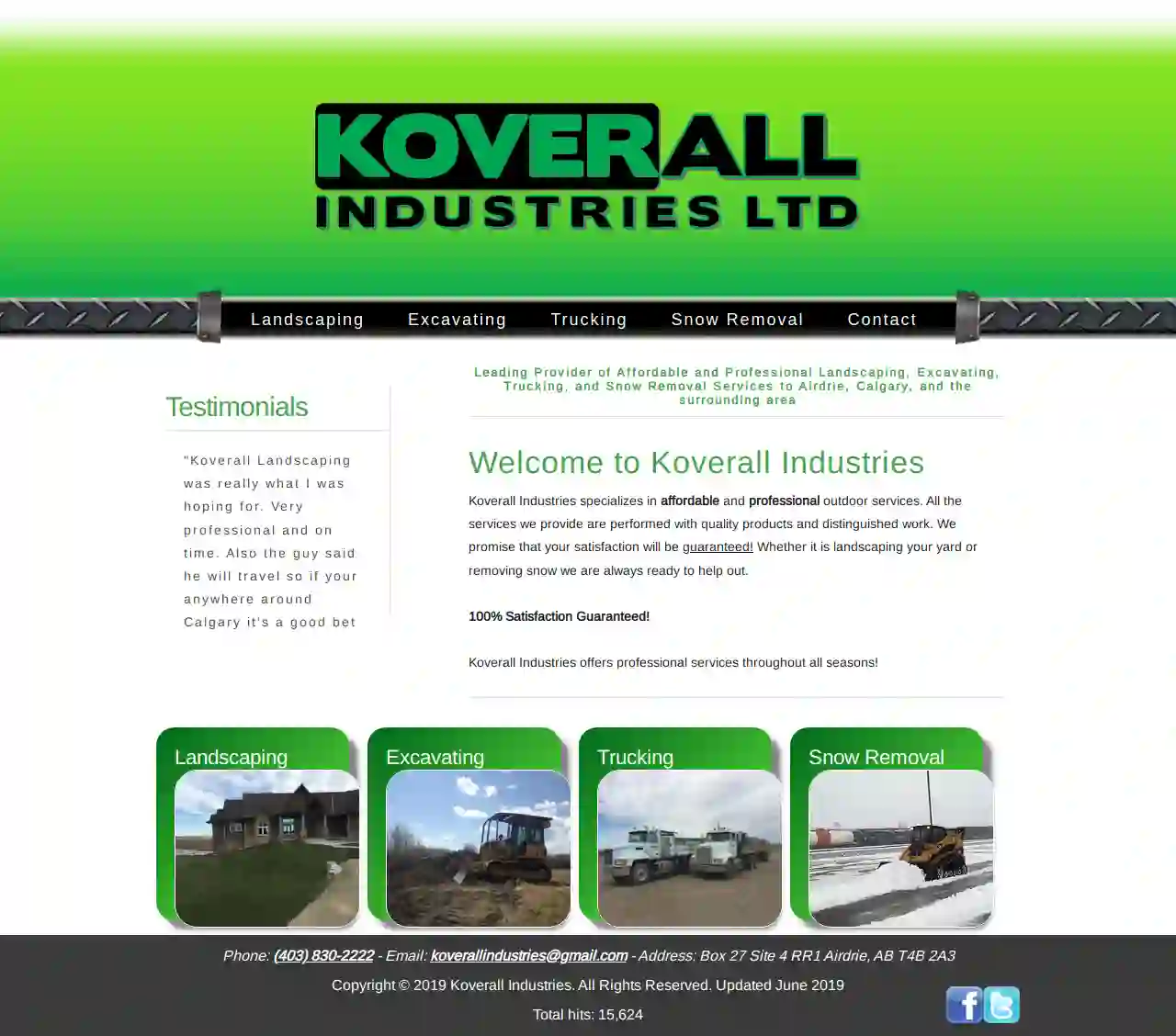Excavation Contractors Airdrie
Find top Excavation Services in Airdrie
Receive 3 FREE Excavation Companies quotes for your project today! Compare profiles, reviews, accreditations, portfolio, etc... and choose the best service.
- 2
2 Sons Excavating Ltd.
52 reviewsAirdrie, GB- Services
- Why Us?
Get Quote 
Koverall Industries Ltd.
4.917 reviewsBox 27 Site 4 RR1, Airdrie, T4B 2A3, GBLeading Provider of Affordable and Professional Landscaping, Excavating, Trucking, and Snow Removal Services to Airdrie, Calgary, and the surrounding area Welcome to Koverall Industries Koverall Industries specializes in affordable and professional outdoor services. All the services we provide are performed with quality products and distinguished work. We promise that your satisfaction will be guaranteed! Whether it is landscaping your yard or removing snow we are always ready to help out. 100% Satisfaction Guaranteed! Koverall Industries offers professional services throughout all seasons!
- Services
- Why Us?
- Testimonials
- Gallery
Get Quote- Sh
ShearForce Equipment
48 reviewsAirdrie, GB- Services
- Why Us?
Get Quote - Ex
Excavation Pros of Airdrie
52 reviewsAirdrie, GB- Services
- Why Us?
Get Quote - Av
Avery Excavating Ltd.
1Airdrie, GB- Services
- Why Us?
Get Quote - WJ
WJ - Airdrie, Scotland Depot
4.34 reviewsAirdrie, GB- Services
- Why Us?
Get Quote - KC
KC Hydrovac Services LTD
1Airdrie, GB- Services
- Why Us?
Get Quote - Gr
Greencorn General Contracting Ltd.
52 reviewsAirdrie, GB- Services
- Why Us?
Get Quote
Over 11,537+ Excavation Contractors on our platform
Our excavation experts operate in Airdrie & surroundings!
ExcavationHQ has curated and vetted the Best Excavation Pros near Airdrie. Find the most trustworthy pro today.
Frequently Asked Questions About Excavation Contractors
- Project Size and Scope: Larger, more complex excavations naturally take longer.
- Soil Conditions: Rocky or challenging soil types can slow down progress.
- Site Accessibility: Limited access might require more time for maneuvering equipment and hauling materials.
- Weather: Inclement weather can cause delays.
- Permitting and Inspections: Waiting for permits or inspections can extend the timeline.
- Clearly Define the Scope: Outline the project's goals, including the excavation area, depth, grade, and intended use.
- Obtain Necessary Permits: Research and acquire any required permits from your local authorities.
- Mark Utility Lines: Contact your utility companies to locate and mark underground utilities to prevent damage.
- Communicate with Neighbors: Inform your neighbors about the project's timeline and potential noise or disruptions.
- Prepare the Site: Clear any obstacles, such as vegetation, furniture, or structures, from the excavation area.
- Discuss Safety Protocols: Review safety procedures with the contractor to ensure a safe work environment.
How long does an excavation project take?
What is the difference between cut and fill excavation?
Cut: Involves excavating soil from an area where the existing grade is higher than the desired grade.
Fill: Refers to using the excavated soil ('cut' material) to raise the grade in an area where the existing grade is lower than desired.
This method minimizes the need to import or export soil, reducing costs and environmental impact. It's commonly used for site preparation, road construction, and landscaping.
What should I do before excavation starts?
What is the difference between topsoil and subsoil?
Topsoil: The uppermost layer, typically rich in organic matter, nutrients, and microorganisms. It's essential for plant growth and is often darker in color.
Subsoil: The layer beneath the topsoil, containing less organic matter and generally denser. It provides support for roots but is less fertile than topsoil.
During excavation, topsoil is often removed and preserved separately for later use in landscaping, while subsoil is typically used for backfilling or other less demanding applications.
How long does an excavation project take?
- Project Size and Scope: Larger, more complex excavations naturally take longer.
- Soil Conditions: Rocky or challenging soil types can slow down progress.
- Site Accessibility: Limited access might require more time for maneuvering equipment and hauling materials.
- Weather: Inclement weather can cause delays.
- Permitting and Inspections: Waiting for permits or inspections can extend the timeline.
What is the difference between cut and fill excavation?
Cut: Involves excavating soil from an area where the existing grade is higher than the desired grade.
Fill: Refers to using the excavated soil ('cut' material) to raise the grade in an area where the existing grade is lower than desired.
This method minimizes the need to import or export soil, reducing costs and environmental impact. It's commonly used for site preparation, road construction, and landscaping.
What should I do before excavation starts?
- Clearly Define the Scope: Outline the project's goals, including the excavation area, depth, grade, and intended use.
- Obtain Necessary Permits: Research and acquire any required permits from your local authorities.
- Mark Utility Lines: Contact your utility companies to locate and mark underground utilities to prevent damage.
- Communicate with Neighbors: Inform your neighbors about the project's timeline and potential noise or disruptions.
- Prepare the Site: Clear any obstacles, such as vegetation, furniture, or structures, from the excavation area.
- Discuss Safety Protocols: Review safety procedures with the contractor to ensure a safe work environment.
What is the difference between topsoil and subsoil?
Topsoil: The uppermost layer, typically rich in organic matter, nutrients, and microorganisms. It's essential for plant growth and is often darker in color.
Subsoil: The layer beneath the topsoil, containing less organic matter and generally denser. It provides support for roots but is less fertile than topsoil.
During excavation, topsoil is often removed and preserved separately for later use in landscaping, while subsoil is typically used for backfilling or other less demanding applications.